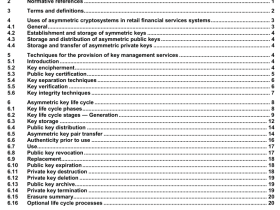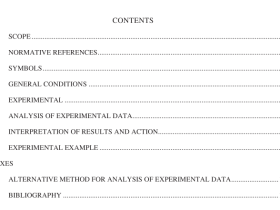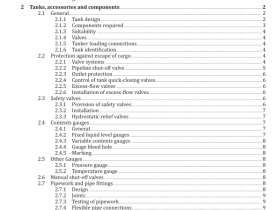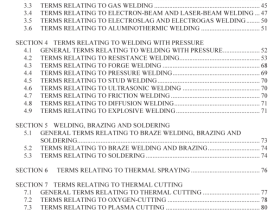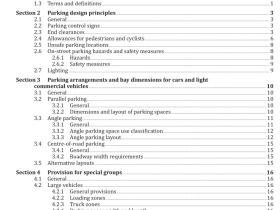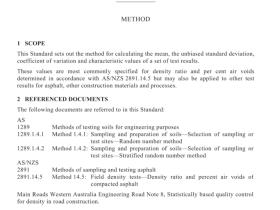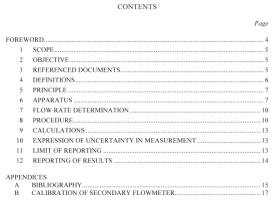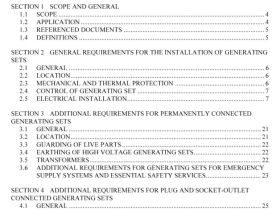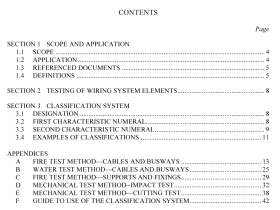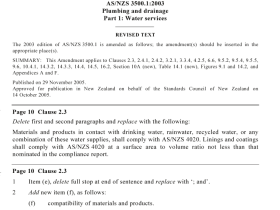AS NZS 4020 pdf download – Testing of products for use in contact with drinking water
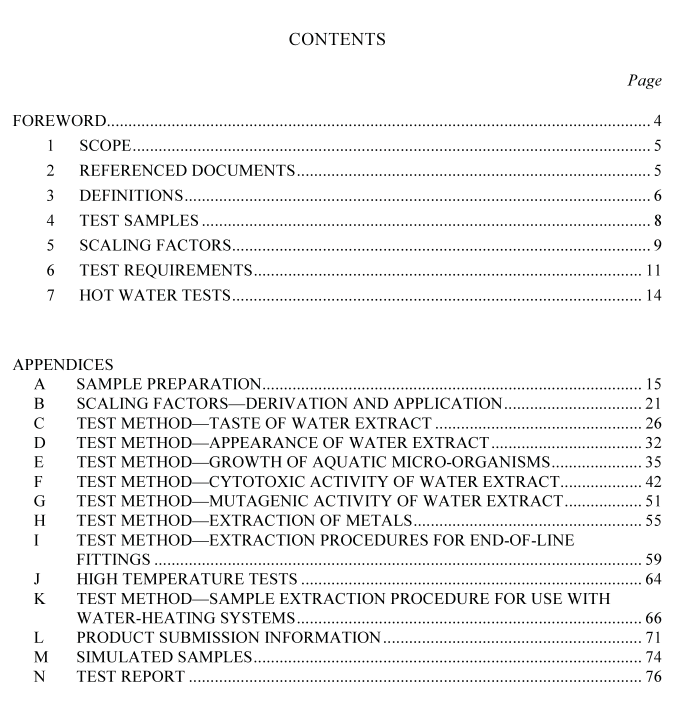
AS NZS 4020 pdf download – Testing of products for use in contact with drinking water
3.2Colour (true colour)
The colour produced by a solution containing 1 mg of platinum per litre (in the form ofhydrogen hexachloroplatinate(IV) in the presence of 2mg “of cobalt(II) chloridehexahydrate per litre).
NOTE:The unit of colour is the Hazen Unit (HU).3.3Composite product
A product in which more than one type of material is in contact with drinking water,e.g.aproduct having both metal and plastic exposed surfaces.
NOTE: Where the composite product is wholly metallic, it is tested as such.3.4Cytotoxic
Poisonous (toxic) to cells under the conditions of test.3.5 Drinking water
Water that has the potential for human consumption,food preparation,utensil washing andoral hygiene.For the purpose of this Standard
(a)tap water and drinking water are synonymous;(b)cold water has a temperature less than 40°C; and
(c)hot water has a temperature in the range 40°C to 8o°C inclusive, except where variedin accordance with Clause 3.9.
3.6 End-of-line fitting
Any product,or part of a product,installed within 250 mL draw-off of a drinking waterdelivery point.
NOTE: Products typically include taps,tap components,fittings,flexible tubes, drink dispensers,boiling water dispensers, drinking fountains, water treatment appliances, hose-connection ‘vacuumbreakers, ball valves and flow-control valves.
3.7Extract (leachate)
The solution formed when the product has been in contact with the test water.3.8 Extractant water
See ‘test water’.
3.9 Maximum holding water temperafure
The temperature,nominated by the manufacturer,at which the product is held in contactwith water for an extended period,e.g. several hours. During this time,there is a no-flowcondition through the product.
3.10 Mutagenic
Causes genetic changes to bacteria under the conditions of test.3.11Organoleptic
Pertaining to a method of systematically assessing the effects of a substance on the humansenses, particularly taste or smell.
3.12 Product
A manufactured item that comes into contact with drinking water,including a componentpart of a manufactured item.
3.13Sample
A product, or part of a product, submitted for testing for suitability for use in contact withdrinking water.
3.14 Scaling factor
The ratio of the end-use surface area-to-volume ratio to the test surface area-to-volumeratio.
3.15Taste panellist
An individual who has volunteered and who has been trained to participate in theassessment of water samples for taste.
3.16 Test water
Water in contact with normally in-service wetted surface areas and used as the medium toobtain extracts from samples of the product under test.
3.17 Threshold dilution
The highest dilution level of the sample at which a taste is detectable.3.18 Turbidity
Reduction of transparency of a liquid caused by the presence of undissolved matter.NOTE:The unit of turbidity is the Nephelometric Turbidity Unit (NTU).
3.19 Water fitting
Anything fitted or fixed in connection with the supply,measurement, control, distributionand utilization of water.
4TEST SAMPLES
4.1 Selection and preparation of samples
The sampling of product and preparation of samples for testing shall be carried out inaccordance with Appendix A. Sufficient samples of the product shall be provided toconduct all of the tests required.
Products may be tested as a complete assembly or the separate components or sub-assemblies may be tested individually.For test results from components or sub-assembliesto be acceptabie, the sum of the tested exposures shall be equal to or greater than the actualexposures of the complete assembly, except for the growth of micro-organisms test,wherethe tested exposure shall be in the range of 1000 mm2/L to 15 000 mm2/L.
NOTE: Care should be taken in considering the approval of materials that are not in final productform. The performance of materials is affected by the processing conditions, which may influenceresults of the tests described in this Standard. Any changes in the material formulation,theprocess of manufacture, the method of application, or the surface area-to-volume ratio in end usecould affect the suitability of the product for use in contact with drinking water and re-testingmay be required.
